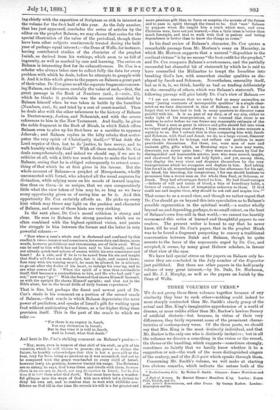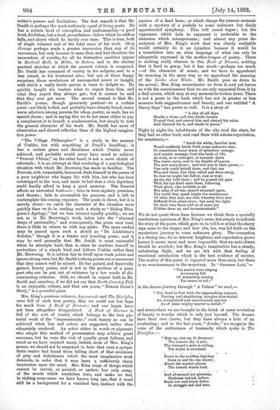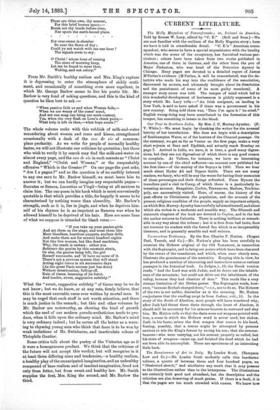THREE VOLUMES OF VERSE.*
WP do not group these three volumes together because of any similarity they bear to each other—nothing could indeed he more sharply contrasted than Mr. Smith's sturdy grasp of the actual and Mrs. King's imaginative apprehension of a world of dreams, or more unlike either than Mr. Barlow's lawless fluency of artificial rhetoric—but because, in virtue of their very differences, they fairly represent some of the prominent charac- teristics of contemporary verse. Of the three poets, we should, say that Mrs. King is the most distinctly individual, and that Mr. Barlow is the only one who is distinctly imitative ; but in all the volumes we discern a something in the vision or the record, the theme or the handling, which suggests—sometimes strongly,. sometimes so faintly that we hardly know whether it be a suggestion or not—the work of the more distinguished singers of the century, and of the Zeit-geist which speaks through them..
Concerning Mr. Smith's volume, we will make at starting two obvious remarks, which indicate the nature both of the • North-Country Polk•. By Walter C. Smith. Glasgow : James hIsolehose nndi
SOUL
A Book of Dreams. By Harriet Eleanor Hamilton K'ng. London : Kogan, Paul, Trench, and Co. An Actor's Thminisconces, and other Poems. By George Btrlow. Landon: Remington and Co.
writer's powers and limitations. The first remark is that Mr. Smith is perhaps the most uniformly equal of living poets. He has a certain level of conception and craftsmanship—a good level, doubtless, but a level, nevertheless—below which he seldom falls, and above which ho hardly ever rises. This is true, both of single volumes and of the total mass of his work. Olrig Grange perhaps made a greater impression than any of its successors, but only because it came first, and had therefore the momentum of novelty, for all its distinctive qualities appear in Borland Hall, in Hilda, in Baban, and in the shorter poetical sketches of which the present volume is composed. Mr. Smith has command of variety in his subjects, and, to a less extent, in his treatment also ; but not of those happy surprises, those revelations of unsuspected power or insight, with which a really fertile genius is wont to delight us. He quickly taught his readers what to expect from him, and what they expect they always get ; but it cannot be said that they ever get more. The second remark is that Mr. Smith's poems, though genuinely poetical—to a certain point—are likely to find, and probably have already found, many warm admirers among persons for whom poetry, as such, has no special charm ; and in saying this we do not mean either to pay a compliment or to launch a condemnation, but simply to note the general character of his work. Mr. Smith has more of observation and shrewd reflection than of the highest imagina- tive power.
"The Village Philosopher" is a study in the manner of Crabbe, but with something of Praed's handling ; it has a certain grace and daintiness which Crabbe never achieved, and probably would never have cared to achieve•
Provost Chivas," on the other hand, is not a mere sketch of externals ; it is an attempt at that rendering of a psychological situation with which Mr. Browning has made us familiar. The Provost, rich, respectable, honoured, finds himself in the power of a poor neighbour who began life with him, but who has been outstripped in the race, and made to feel that a civic dignitary could hardly afford to keep a good memory. The Provost affects an unwonted bonhomie ; tries in turn cajolery, promises, and threats ; fails to accomplish his purpose, and is left to contemplate his coming exposure. The poem is clever, but it is merely clever ; we catch the character of the situation more quickly than we do in reading such a study as " Bishop Blon- gram's Apology," but we lose interest equally quickly ; we are not, as in Mr. Browning's work, taken into the " abysmal deeps of personality," and consequently, the poem once read, there is little to return to with any gusto. The same verdict may be passed upon such a sketch as "Dr. Linkletter's Scholar," though it is a tender and touching poem ; and it may be said generally that Mr. Smith is most successful when he attempts least, that is, when he confines himself to portraiture of a simple kind, and follows Crabbe rather than Mr. Browning. It is seldom fair to dwell upon weak points and ignore strong ones, but Mr. Smith's strong points are so numerous that they cannot well be missed. He has gained, and deservedly gained, hearty praise, and is not in the position of a puny poet who can be put out of existence by a few words of dis- criminating criticism. Still, we should be unjust both to Mr. Smith and ourselves, if we did not say that North.Country Folk is an enjoyable volume, and that one poem, " Deacon Dorat's Story," is a powerful piece.
Mrs. King's previous volumes, Aspromonte and The Disciples, were full of such true poetry, that we could not but hope for much from A Book of Dreams ; and our hopes have not been altogether disappointed. A Book of Dreams is full of the sort of beauty which belongs to the best pic- torial work of the " impressionists ;" such beauty as can be achieved when line and colour are suggested, rather than adequately rendered. An artist either in words or pigments who adopts this method of presentation may achieve great successes, but he runs the risk of equally great failures, and much as we have enjoyed many, indeed, most of Mrs. King's poems, we should not be surprised to hear that even a sympa- thetic reader had found them falling short of that minimum of grip and definiteness which the most imaginative work demands, in order that it may leave a sufficiently sharp impression upon the mind. Mrs. King sings of things which cannot be carved, or painted, or spoken, but only sung ; of the moods which annihilate time, and make us feel, in visiting some scene we have known long ago, that it must still be a background for a vanished face, instinct with the
passion of a dead hoar; or which charge the present moment with a mystery of a prelude to some unknown but dimly apprehended symphony. This will Bound vague ; but the vagueness which fails to represent is preferable to the clearness which misrepresents ; and almost any prose de- scription of Mrs. King's work that was clearly realisable would certainly do it an injustice, because it would be a translation into an alien language of what can only be adequately expressed in the mother-tongue of poetry. There is nothing really obscure in this Book of Dreams, nothing that is hard to grasp, but it has much—perhaps too much —of the character of music, and we have to apprehend its meaning in the same way as we apprehend the meaning of the Lieder ohne Mile. Mr. Smith pins us down to the actual ; Mrs. King emancipates us from it, and yet leaves us with the consciousness that we are only separated from it by a frail screen, which may at any moment be broken down. There is not a poem in the book which has not in greater or less measure both suggestiveness and beauty, and one entitled "A Starry Sign" has power as well. It is a story of
" A city of old days Beside a river,—all who dwelt therein Feared God, and served him and obeyed his voice, And listened for it, and abode in peace."
Night by night the inhabitants of the city read the stars, for they had no other book, and read them with solemn expectation, for sometimes,—
"Amid the white, familiar host Would suddenly break forth some unknown star, Or sometimes many stars, of splendour strange, And mystic message from the lords of life.
At even, or at midnight, or towards dawn The vision came, and in the depths of heaven
The new stars shone ; and this was in their power,—
One only could behold them, and that one Who saw them, him they called and drew away, So that he might but follow, east or west, As the sky held them ; and he passed the gate With his eye fixed upon them, following Their glory, else invisible to all.
But none of all who passed returned again, Nor could they speak aright the semblances Of what they saw, nor that whereby their star Differed from other stars; but most the light On their own faces told us of some joy Hidden from us, and incomtnanicate."
We do not quote these lines because we think them a specially meritorious specimen of Mrs. King's verse, but simply to indicate the story of the poem, which goes on to tell how at last the starry sign came to the singer, and how she, too, was led forth on the mysterious journey to some unknown glory. The conception is a daring one, for as interest heightens and expectation grows keener it seems more and more impossible that an anti-climax should be avoided ; but Mrs. King's imagination has a steady, unfaltering flight, and we are left with that feeling of emotional satisfaction which is the best evidence of success. The motive of this poem is repeated more than once, but there is no wearisomeness in the monotony. In " Summer Lost,"—
" The merles were singing As evening fell
Of something coming Too sweet to tell ;"
in the dream-journey through "A Palace" we read,— " Yet, head to foot with the approaching capture, Panting and shuddering, mingles therewithal An unexplained and unaccounted rapture As of some mighty marvel to befall ;"
and everywhere we are brought to the brink of some revelation of beauty or wonder which is only just beyond. The dreams have their own charm, but they have always a hint of an awakening ; and in the last poem, " Awake," we recognise the voice of the enthusiasm of humanity which spoke in The Disciples :—
"Rise up, rise up, 0 dreamer ! The eastern sky is red ; The trumpet's note is calling, The storm is overhead.
. . . . . . Down in the trodden highway Goes to and fro the crowd ; About the market-places The tumult waxes loud.
. . .... And all around are pressing, Darkness behind, before, Souls low and heavy-laden In ;draggle sad and sore. These are thine own, thy nearest, For this brief human space;— Break not thy bonds before-time, Nor spurn the earth-bound place.
. . . ...
For over-sweet is slumber So near the dawn of day ; Could ye not watch with me one hour ?
The signals seem to say.
0 Christ ! whose hour of coming The stars of morning keep, Let me be found to meet thee, Waking, and not asleep."
From Mr. Smith's healthy realism and Mrs. King's rapture it is depressing to enter the atmosphere of sickly senti- ment, and occasionally of something even more repellent, in which Mr. George Barlow seems to live his poetic life. Mr. Barlow is very fond of asking questions, and this is the kind of question he likes best to ask
When passion fails ns and when Woman fails,— When we are weary of the roses' scent, And not one song can bring our souls content, Yea, when the very flush on Love's cheek pales,— What help is left us then,—what hope avails ?"
The whole volume reeks with this rubbish of milk-and-water maundering about women and roses and kisses, strengthened occasionally with a dash of the eau de vie of common- place profanity. As we write for people of normally healthy tastes, we will not illustrate our criticism by quotation ; but those who wish to verify it by search may find the milk-and-water on almost every page, and the eau de vie in such sonnets as " Christ and England," "Christ and Woman," or the unspeakably offensive "Which is the Greater P" On one page the poet asks, "Am I a pagan ?" and as the question is of no earthly interest to any one save to Mr. Barlow himself, we must leave him to answer it; but we can hardly imagine any respectable pagan— Socrates or Seneca, Lucretius or Virgil—being at all anxious to claim him. The one poem in his book which is most conveniently quotable is that which provides a title, for happily it seems to be characterised by nothing worse than absurdity. Mr. Barlow's strength, such as it is, lies in jingle, and when he deprives him- self of his rhymes he is as impotent as Samson was when he allowed himself to be deprived of his hair. Here are some lines of what we suppose is intended for blank verse :— " If you take up your genius-girls And set them on the stage, and treat them like Mere bloodless, heartless puppets, soulless dolls, And make them act for several hundred nights Not like live women, but like dead machines, Why, the result is certain : either you
Subtract the genius by this constant strain, Or else, the genius being left, the girl
Herself succumbs, and 'ill have no more of it. There's not a nervous system that will stand Acting eight times in six successive days (As the great Paris actress just has done) Without deterioration, falling-off,
Rain of tissue, lessening of its force,
And tender, sweet, suggestive subtlety."
What the " sweet, suggestive subtlety" of tissue may be we do not know; but we do know, or at any rate, firmly, believe, that this is the most execrable verse ever written by mortal man. It may be urged that such stuff is not worth attention, and there is much justice in the remark ; but this and other volumes by Mr. Barlow are noteworthy, as showing the kind of growth which the seed of our modern psendo-restheticism tends to pro- duce, when it falls upon the ordinary mind. Mr. Barlow's mind is very ordinary indeed ; but he serves all the better as a warn- ing to rhyming young men who think that fame is to be wou by weak imitations of Mr. Swinburne, and inarticulate echoes of Th4ophile Gautier.
Some critics talk about the poetry of the Victorian age as if it were a homogeneous product. We think that the criticism of the future will not accept this verdict, but will recognise in it at least three differing aims and tendencies,—a healthy realism, a healthy play of the emancipated imagination, and an unhealthy compound of base realism and of insolent imagination, freed not only from fetter, but from sweet and healthy law. Mr. Smith supplies the first, Mrs. King the second, and Mr. Barlow the third.




































 Previous page
Previous page